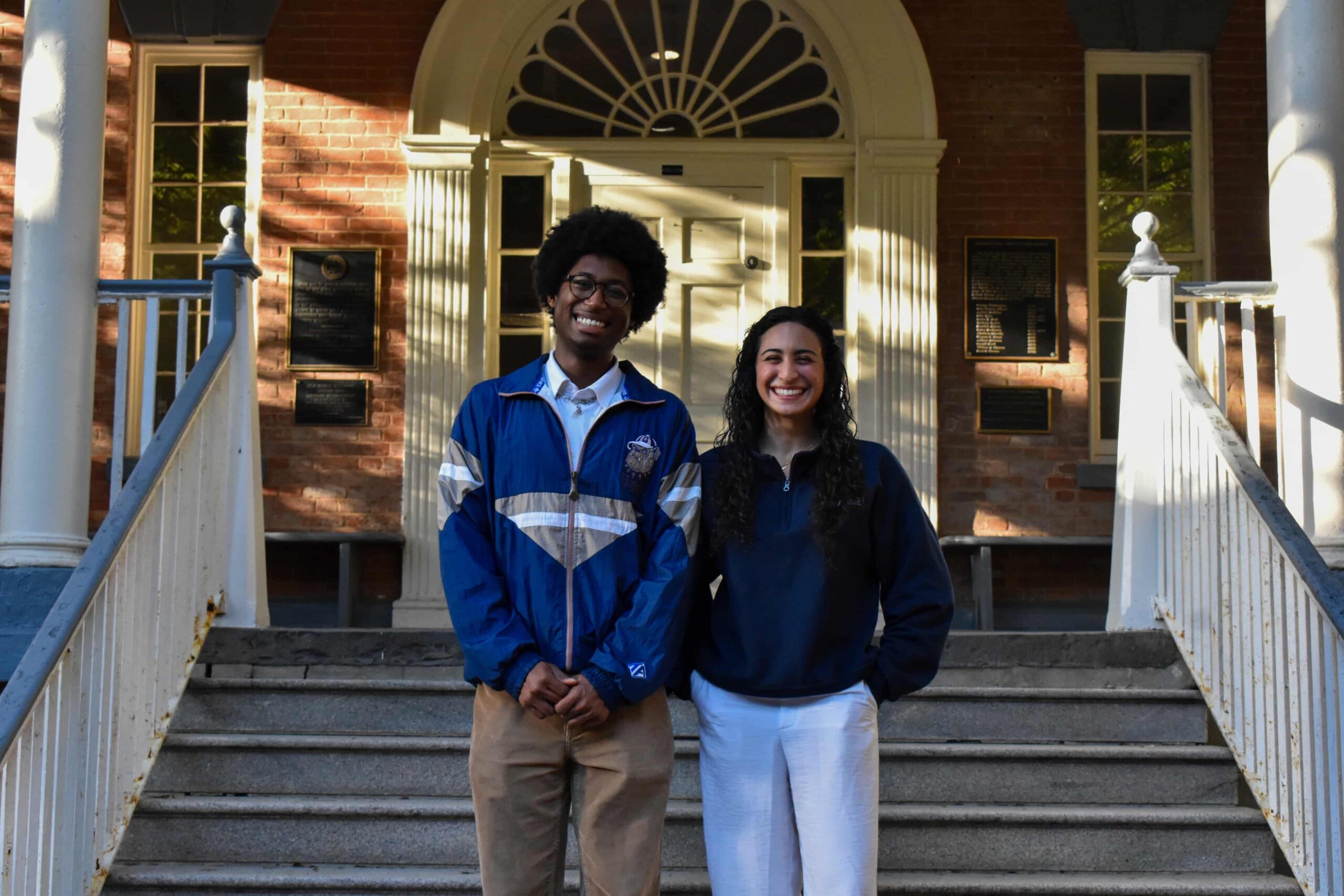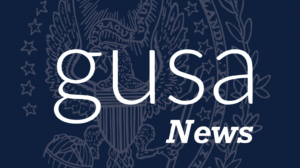Given its weak administrative role, some have argued that Georgetown University Student Association (GUSA) should be apolitical, instead focusing its efforts on its limited areas of authority, such as funding for clubs and negotiating with the administration.
This perspective is unambitious in a time when our national landscape demands formidable leadership from students. It is, of course, vital that many of the meticulous aspects of campus are addressed by our student government. Still, a commitment to day-to-day operations should not obscure a larger vision that extends beyond our campus.
Two tickets, Rao-Weaver and Hughes-Williams, fail to present a vision that addresses the concerns of the student body beyond campus operations. The idea that GUSA should only focus on so-called “campus issues” is a farce, given that each repressive action, from our university’s limitation of protest to Trump’s deployment of militarized agents on U.S. streets, will inevitably affect our student body. In this moment, a deference to power in our university and nation is dangerous to the safety of students.
In this light, the Wagner-Missaghi ticket offers a progressive, structural vision of GUSA’s role. Following interviews with all three tickets, The Georgetown Voice is proud to endorse Darius Wagner and Nazgol Missaghi.
Wagner-Missaghi
Key frustrations of the student body, in the editorial board’s view, stem from Georgetown being an expensive, opaque institution that prioritizes maintenance of its legacy over the needs of its students. We have chosen to endorse Wagner-Missaghi because their ticket offers actionable policies that aim to challenge the status quo of our university around financial equity, student autonomy, and administrative transparency.
For this board, a crucial factor in our endorsement rests in a ticket’s willingness to confront the mechanisms of institutional privilege. Wagner and Missaghi have distinguished themselves by focusing their energy on structural reforms. For example, they call for the end of legacy admissions, a policy that has long served the children of alumni. Hoyas Against Legacy, a student group campaigning to eliminate legacy admissions at Georgetown, was started by Wagner alongside current GUSA President Ethan Henshaw. Missaghi brings an additional perspective as a pre-medical student, who is also involved with the Center of Social Justice and First-Year Orientation to Community Involvement. She was also on campus this past summer, with Missaghi telling the Voice that she witnessed the impacts of federal cuts to research programs and “had a front row seat to ICE, to the National Guard, coming to Georgetown.” The wide variety of experience brought by Wagner-Missaghi is a defining benefit of the campaign.
It is also important to note that out of the three campaigns running, Wagner-Missaghi is the only ticket who has pledged to re-negotiate the Israeli divestment referendum, which passed with 67% support from student voters last Spring. Wagner told the Voice he plans to push the University to “abide by their Socially Responsible Investment Policy” to prevent student dollars from funding “weapons of war and systems that target innocent civilians.”
We are proud of Wagner’s recognition of the genocide against Palestinians and his opposition to our tuition money funding some of the most heinous crimes against humanity. Yet, it is puzzling to the editorial board how two out of three tickets are willfully ignoring the voice of the student body they aim to represent.
We are also encouraged to see the Wagner-Missaghi ticket honor the principle of worker solidarity. Underlining this value, Darius shared with the Voice that he met a Georgetown University Transportation System (GUTS) driver while participating in the Georgetown Coalition for Workers’ Rights’ solidarity rides. Despite having worked for Georgetown for 15 years and being only a year away from qualifying for retirement, the driver “will be losing [his benefits] in the subcontracting process,” Wagner said. Wagner-Missaghi’s pledge to support the Georgetown Resident Assistant Coalition (GRAC) and GUTS drivers, along with a proposal to institute an Immigrant Worker Citizenship Fund, demonstrates an understanding that the challenges of students and workers are intertwined.
The campaign has earned support from a range of student groups across campus, receiving endorsements from organizations including the Georgetown American Civil Liberties Union (ACLU), H*yas for Choice, GRAC, and several affinity houses. The Wagner-Missaghi campaign told the Voice it had spoken with 38 student groups in total to discuss their plans if elected. In this, we believe their coalition represents a diverse range of voices and exhibits the duo’s nuanced understanding of student concerns.
Rao-Weaver
There is another ticket with formidable experience in student government: the Rao-Weaver campaign. Currently, Saahil Rao and Zadie Weaver serve as Speaker and Vice-Speaker of the GUSA Senate, respectively. Their platform demonstrates an understanding of the issues facing students on campus, focusing heavily on student life, with their prominent policy being to “Save Vil A.” We believe that many of their proposals have merit, particularly their plan to free up $150,000 in the Student Activities Fund through alumni donations and their proposal to begin an open-access email list to increase club communication and event promotion. Rao-Weaver’s central message is that their “job is Georgetown” and will aim to protect Hoyas’ ability to party and have leisure time.
While the editorial board is interested in providing greater outlets for students, the campaign falls short in other key areas. Primarily, the campaign exemplifies the limits of incrementalism and overemphasizes parts of its platform without a cohesive belief driving its policy. While the Wagner-Missaghi campaign is able to identify systemic flaws within Georgetown’s campus, the Rao-Weaver campaign seems to miss the bigger picture.
Their 11-point policy outline fails to mention the enforcement of Georgetown’s policies related to Socially Responsible Investing and Just Employment. Despite their promise to restore GUTS drivers to full-time status, the ticket has not clearly articulated the specific actions they will take, nor have they detailed their current engagement on the issue. Additionally, the campaign’s proposal to extend Leo’s hours fails to mention the potential impact on dining staff. While the campaign is certainly not malicious in this omission, we would have liked to see greater focus on the additional members of the Georgetown community outside of the student body.
Another concern is the ticket’s lack of commitment to progressive actions if elected. At a recent town hall, Rao stated he opposed the divestment referendum, adding that divestment from the Fortune 500 companies cited in the referendum would unnecessarily strain Georgetown’s finances. He defended his position, saying to the Voice, “my first principle is making sure that the university can run well financially because we know that benefits everyone across the board.”
We find this statement to be disappointing as it places the interests of Georgetown’s economic ventures over the University’s alleged commitment to “Socially Responsible Investing.” Weaver added that she “didn’t like the language in the referendum” and criticized it for being “pushed through the Senate.” Concerns about the procedure may be valid, but a lack of a pledge to further push the administration to consider divestment is a shortcoming of the platform.
This campaign, like many other GUSA executive races, has featured personal drama, centered aroundRao’s membership in the Stewards, a secret society, which he publicly confirmed to be true. While we appreciate the directness in Rao’s admission of membership, the shroud of secrecy makes it difficult to judge the extent of their influence.
However, our endorsement in this race was not impacted solely by this biographical fact. Instead, the editorial board primarily disagrees with the campaign’s limitation of their vision to the walls of campus.
Hughes-Williams
A third campaign, the Hughes-Williams ticket, presents several major flaws that worry the editorial board. Candidates Luke Hughes and Mikey Williams seem to be more interested in accommodating the requests of Georgetown’s administration than those of the student body. Their limited 4-page platform offers few specific policies and instead outlines an ambitious restructuring of GUSA by reducing the power of the legislative branch and placing the executive at the core of the organization. The editorial board questions how realistic their “right-sizing” plans are and doubt it would solve any of the issues facing the student body.
Several statements by the campaign in interviews and the recent town hall are concerning. When the Voice asked about his stance on the divestment referendum, Hughes replied that he did not support it and believed the question presented a “gross double-standard” toward Israel compared to Qatar and China, to which Georgetown also has ties. The quickness to present whataboutism in the face of genocide and apartheid against the Palestinian people was troubling.
Furthermore, when asked about how GUSA should respond to the Trump Administration’s actions, which threaten students and the D.C. community at large, Hughes responded that GUSA should only focus on political activities that “directly impact students” rather than becoming a “political mouthpiece.” Instead of mounting campaigns of pressure on our school’s administration, a Hughes-Williams executive would instead “follow University policies” and prioritize collaboration over opposition with the administration. When asked whether his executive would push the university to uphold its Just Employment Policy, Hughes responded that his ticket had “not discussed that in as much detail.”
The ticket seems detached from the community they aim to serve, evident by the fact that the head of the ticket is currently abroad for the semester. While both Hughes and Williams have experience in student organizations, neither candidate was able to articulate clear qualifications for the executive position or provide much substance about their accomplishments on campus. While Hughes’ positive relationship with members of the administration, which he told the Voice he has developed in his time on campus, could be beneficial in negotiations, his reluctance to challenge university policies means his tenure would bring tameness in a time that demands bold leadership.
Conclusion
The Wagner-Missaghi ticket has demonstrated an approach to administration that prioritizes the concerns of students while remaining pragmatic. The ticket has the experience necessary to navigate adversarial relationships, with Wagner acknowledging to the Voice that “admin isn’t going to tell you the truth a lot of times, and you have to be able to discern when you’re being thrown in a loop.” Still, he concludes, “with our experience working with them, I have a pretty good pulse on working through some of those strings.”
Wagner’s time as Vice-President over the past year, along with his disappointment in the Georgetown administration’s failures, has demonstrated his capacity to serve as an effective President who can push back on the administration when necessary.
The executive of our Student Government must not be indistinguishable from the administration and should instead prioritize combating policies that harm students. As an immensely privileged university, we have a duty to elevate leadership that embodies the value of “People for Others,” not just for those within Georgetown gates, but to the entire community of which our campus is a part.
Thus, we strongly urge you to cast your vote for Wagner-Missaghi.
Voting for the GUSA Executive will take place between Oct. 22 and Oct. 24.
The editorial board is the official opinion of The Georgetown Voice. The editorial board operates independently of the Voice’s newsroom and the General Board. The board’s editorials reflect the majority opinion of the board’s members, who are listed on the masthead. The editorial board strives to provide an independent view on issues pertinent to Georgetown University and the broader D.C. community, based on a set of progressive institutional values including anti-racism, trauma-informed reporting, and empathetic and considerate journalism.






